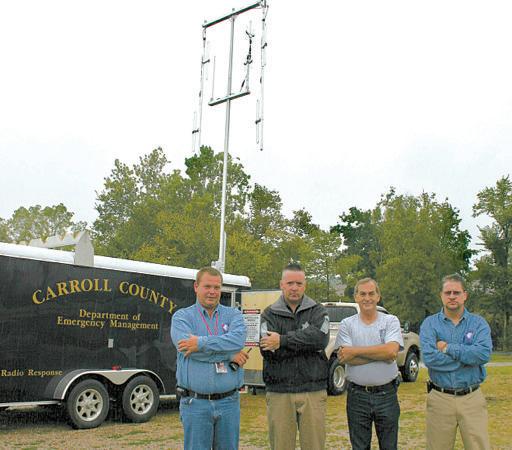
32 minute read
County News
Grant funds emergency response trailer at Carroll County
BERRYVILLE — An emergency response communications trailer was placed into service in Carroll County, purchased with grant funds totaling more than $43,000.
Te money was used to purchase and equip the trailer and to outfit responders with body armor, radios and training.
Te bulk of the money was spent on a specially equipped self-contained trailer that arrived complete with a boom antenna, gas generator, backup batteries, and high-tech communications equipment.
It will be stored in a secure area at the Carroll County Detention Center — available to all law enforcement departments, fire firefighters and emergency service responders, said Jason Morris, with the Carroll County Office of Emergency Management.
According to Morris, it can be used for any kind of emergency; flood, fire, acts of terrorism, or during ice storm power outages since it is self-contained with a gas-powered generator and back-up batteries that can be recharged with the generator.
Morris said his office applied for and received a State Homeland Security Group grant in the amount of $28,675, along with a $14,765 Law Enforcement Terrorism Prevention grant.
Between the two, the trailer was purchased and outfitted with communications equipment. In addition, the money will be used to install an Arkansas Wireless Information Network system in the county’s OEM office to link to agencies nationwide, and pay for body armor for members of the county’s tactical team, and for IED (improvised explosive device) training for all law enforcement personnel throughout the county. – By Anna Mathews Carroll County News
Benton County SO program focuses on youth involvement
Te Benton County Sheriff’s Office started a new juvenile crime prevention program called PAL, or Police Athletic League. PAL is a national organization that was started in the 1940’s and has now grown all over the U.S. Tis program is intended to promote good citizenship in youth, promote positive communication between police officers and kids, and to improve overall moral and civic standards in our youth.
Volunteers involved in this program include sheriff’s deputies, juvenile probation officers, school representatives, community leaders, and other volunteers throughout the county. Benton County SO personnel have teamed up with the Rogers Activity Center and the Boys and Girls Club of Benton County to offer these activities under the supervision and constructive influence of a responsible law enforcement agency.
“We will be sponsoring numerous events, fundraisers, recreational activities and educational activities throughout the year,” said Sgt. Chris Sparks of the Professional Standards Office.
“Tis past summer we selected approximately 60 kids throughout Benton County to be involved in two Jr. Police Academies. During these two weeks the kids were exposed to every division from within the Sheriff’s Office and they had a great time.” Te day after the final graduation the Sheriff’s Office was involved in a basketball fundraiser where Sheriff’s Office employees played ex-Arkansas Razorbacks in a 5 on 5 basketball game at the Bentonville High School. All proceeds from the basketball game benefitted the PAL program.
A second major fundraiser came in October at the Benton County Fairgrounds in the form of a haunted house, put on by the Sheriff’s Office employees with help from PAL youth. Te haunted house ran a total of nine nights and all of the money raised will buy items for the Police Athletic League.
“We are having sheriff’s deputies coach sports teams within the local activity centers and we are trying to have the teams named PAL,” added Sgt. Sparks, who is a key organizer of the program, along with Sheriff Ferguson and Kimberly Sparks, who works for the Benton County Juvenile Probations Office.
(Did an aspect of county government “make news” recently in your county? Did any of your county officials or staff get an award, appointment, or pat on the back? Please let us know about it for the next edition of County Lines magazine. You can write up a couple of paragraphs about it, OR if something ran in your local paper, call and ask them to forward the story to us. We encourage you or your newspaper to attach a good-quality photo, too: email rkemp@arcounties.org)
Donna Wilson leads Arkansas Circuit Clerks into a new year
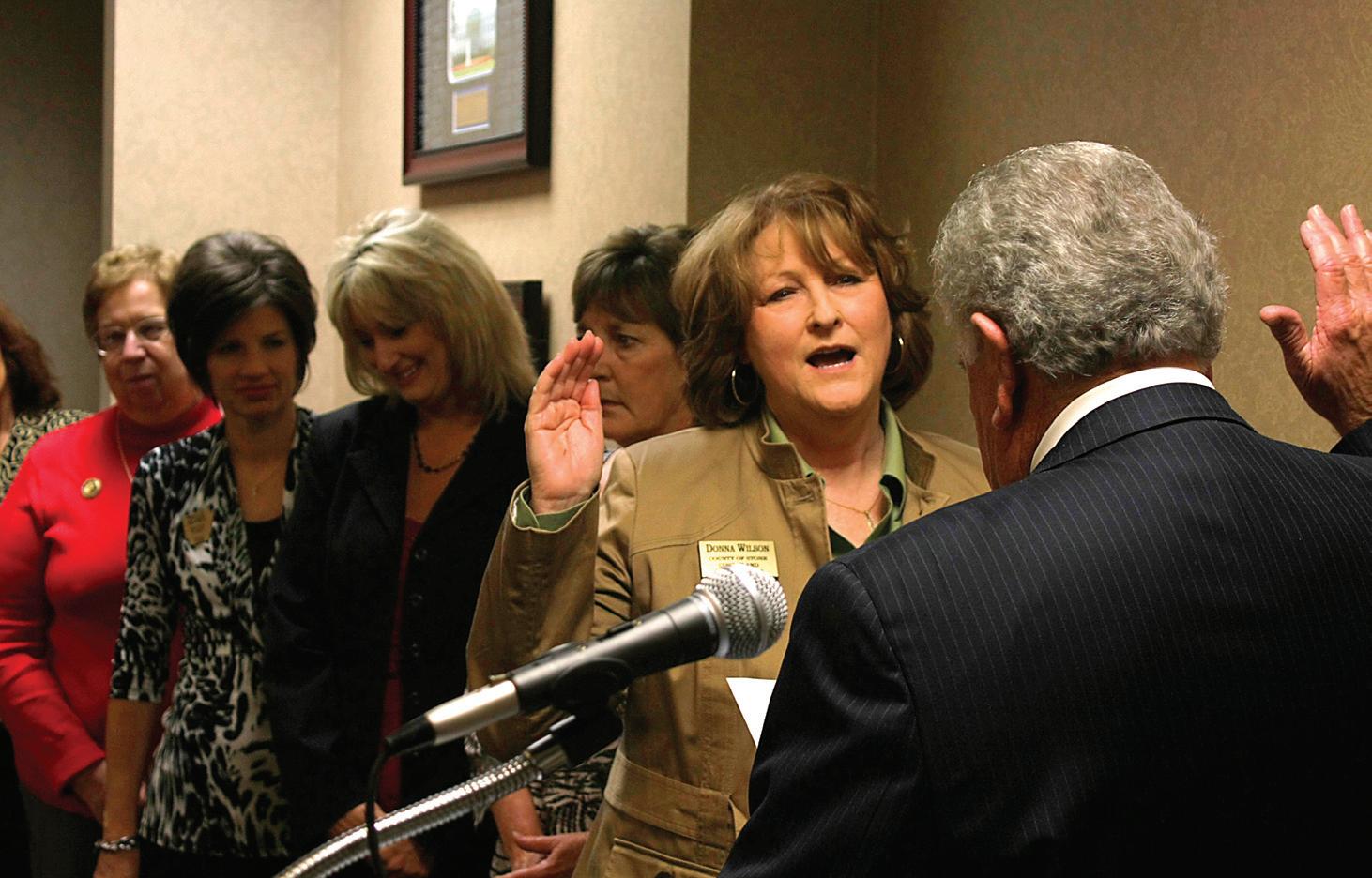
Secretary of State Charlie Daniels swears in new officers and directors at the Arkansas Circuit Clerks Association fall meeting at the Holiday Inn Presidential in Little Rock on Oct. 16. Donna Wilson (foreground) of Stone County was installed as President. Other officers are: Claudia Matthews of Poinsett County, 1st Vice-President; Sharon Blount of Crawford County, 2nd Vice-President; Phyllis Villines of Madison County, Secretary; Vera Reynolds of Lincoln County, Treasurer; and Bobbie Jo Green of Howard County, Historian.
2010 Directors for the Arkansas Circuit Clerks
Association are (from left): Alma Davis,Sharon Gray, Brenda Deshields, Jeannie Steen, Janet L Kilbreath, Cheryl Wilson, Andrea Billingsly, and Jan Griffith. They were installed by Secretary of State Charlie Daniels (center). Vicki Rima (Garland County) and Skippy Leek (Desha County) were re-elected as the AAC Directors (below).
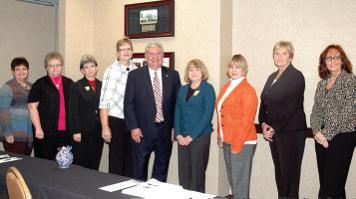

Disasters declared in 52 counties after October’s storms
Gov. Mike Beebe in October and November declared 52 counties eligible for state disaster assistance due to severe and widespread storms, tornadoes and flooding in October.
Te state declaration named Arkansas, Boone, Bradley, Calhoun, Carroll, Chicot, Cleburne, Cleveland, Columbia, Conway, Cross, Dallas, Drew, Faulkner, Franklin, Fulton, Grant, Independence, Izard, Jackson, Jefferson, Johnson, Lafayette, Lawrence, Lee, Lincoln, Logan, Lonoke, Marion, Miller, Monroe, Nevada, Newton, Ouachita, Poinsett, Prairie, Pulaski, Randolph, Saline, Scott, Sharp, St. Francis, Stone, Union, Van Buren, White and Woodruff Counties state disaster areas due to the storms.
Te Nov. 9 declaration was separate from previous declarations for earlier October flooding. Counties listed in the earlier disaster declarations also included Ashley, Clark, Desha, Little River and Madison Counties. All told, 52 Arkansas counties received state disaster status due to severe weather in October.
Nov. 11 – Gov. Mike Beebe authorized $2 million from the Governor’s Disaster Fund to provide limited individual assistance for flood and storm victims in 12 Arkansas counties. Arkansans with uninsured damage to their primary residences may be eligible for State aid in Columbia, Franklin, Grant, Johnson, Lincoln, Logan, Lonoke, Ouachita, Pulaski, Scott, Union and White Counties, the governor said. “While we will request a Presidential Disaster Declaration for flooding damage to infrastructure in Arkansas, we don’t believe we will meet the federal requirements for individual assistance,” Beebe said. “Te state can provide limited funds to help uninsured homeowners in the counties hardest hit start toward recovery.”
Nov 13 – Governor Mike Beebe added Saline County as the 13th county where storm and flood victims may be eligible for limited state aid from the Governor’s Disaster Fund. Beebe earlier authorized the assistance for Arkansans with uninsured damage to their primary residences in Columbia, Franklin, Grant, Johnson, Lincoln, Logan, Lonoke, Ouachita, Pulaski, Scott, Union and White Counties.
President Barack Obama in turn declared 37 Arkansas counties eligible for federal assistance following those severe storms, tornadoes and flooding. Te declaration covered Boone, Bradley, Calhoun, Carroll, Cleburne, Cleveland, Columbia, Conway, Cross, Dallas, Franklin, Fulton, Grant, Izard, Jackson, Johnson, Lafayette, Lawrence, Lincoln, Logan, Marion, Monroe, Nevada, Newton, Ouachita, Poinsett, Prairie, Pulaski, Randolph, St. Francis, Scott, Sharp, Stone, Union, Van Buren, White and Woodruff.
Under the declaration, the federal government provides financial assistance to cover a share of state-and-local costs in storm response and repairs, and the counties are eligible for hazard mitigation grants to help protect against future natural disasters.
President Obama’s declaration did not include federal aid for individual assistance.
Highway dedication honors former Mississippi County Sheriff
Friends, relatives and law enforcement officers from all over Mississippi County were in attendance Nov. 5 for the dedication of the Leroy Meadows Memorial Highway.
County Road 599, which runs in front of the Mississippi County Sheriff's Office and Jail, was officially dedicated as a memorial to the late sheriff. Meadows died March 27 after a long illness.
Sheriff James Sanders, who was chosen by Meadows to run the sheriff's office in his absence, told the crowd how much Meadows and his family meant to him. "Tey're (the Meadows family) supporting and helping me," Sanders said.
Te sheriff said the dedication of the highway was an opportunity for those who knew Meadows to share his legacy with those who didn't. "We know the man, the myth, the legend. Tis memorial is for others to learn what we already know, his kindness, his dedication. Tis will allow us an opportunity to tell someone else and remind others of who (Meadows) is and was," Sanders said.
Meadows was a friend to all and a father figure to all law enforcement and emergency personnel in the county, Sanders said. "He would stand there, with that twinkle in his eye and fold his arms and give you advice. But when he takes his glasses off, you'd better run."
Meadows had been sheriff for 19 years. Before that, he served 40 years as an Arkansas State Police Trooper. Before that, he was in the military.
County Judge Steve McGuire thanked Meadows' family for allowing him to be as committed to serving our county as he was. "We all recognize the quality of person Leroy was," McGuire said. "He committed his entire adult life to serving our country, our state and our county. I want to thank him for his commitment to us."
Sanders said that all in attendance now have a duty to share Meadows' legacy with others. "We will talk about who (Meadows) was and how he was a friend, a father, a big impact on all of us. Tat's our purpose now, to be an impact on somebody's life." Justice Donnie McDaniel, chairman of the quorum court's Police, Fire and Safety Committee, told the crowd that Meadows was "an easy person to talk to," adding that it was "such a privilege to be here to honor" Meadows.
Another speaker was Chuck Lange, executive director of the Arkansas Sheriff's Association, who spoke of his years-long friendship with Meadows. Lange spoke of the times he and Meadows had met in Little Rock to address the legislature and how fond Meadows was of practical jokes.
Captain Larry Robinson, known as "Fish" to all in law enforcement, spoke on behalf of Meadows' family. "To many people, he was the driver's license man," Robinson said, referring the many years Meadows worked as a driver's license examiner in the county. "He gave probably everyone here our driver's license," the deputy said.
Robinson said Meadows would "be so proud" to know that the county was remembering and honoring him in this way. "It's a very big honor to him and his family. We would all like to thank you," Robinson
said.
Te most emotional moments in the ceremony came when Meadows' son, Terry Cole, spoke of his father's dedication to the people of Mississippi County. "It's hard to find the words .... we offer our truly heartfelt thanks," Cole said, obviously holding back tears. "Dad loved being sheriff. He carried out those duties with honor and integrity."
Cole helped his mother, Vivian and other family members unveil the sign that will be posted on County Road 599 naming it the "Leroy Meadows Memorial Highway."

Sheriff James Sanders, right, stands with Mrs. Vivian Meadows and her son, Terry Cole, by one of the signs that will be posted on County Road 599, naming the road in front of the county sheriff’s office and jail as a memorial to longtime Sheriff Leroy Meadows, who died in March after serving the county as
sheriff for 19 years. (Photo / Donna Loyd Hilton)
Leroy Meadows
– By Donna Loyd Hilton Blytheville Courier News
Time to retire, Norris says after 39 years with state prisons
Larry Norris, director of the state Correction Department for the past 16 years, announced that he would retire in January 2010 after working at the department for 39 years. He served as head of the agency longer than any director.
At press-time, Gov. Beebe had not yet recommended a replacement for Norris. Te Arkansas Board of Correction has final approval of who is hired.
When Norris became director 16 years ago there were 14 units in the state prison system. Since then five more units had been added. Tey are the Varner Supermax, Ouachita River at Malvern, the McPherson unit for women near Newport, the Grimes Unit near Newport and the J. Aaron Hawkins Senior Center near Wrightsville.

Far left: Charlie Daniels and 2010 President Janet Troutman Ward; left: Outgoing President Lee Ann Kizzar; below: Secretary Daniels, Larry Fratesi, and Johnny Rye Jr.
(Photos / Secretary of State’s Office)

Assessors’ president uses Internet to help get job done
Te Arkansas Assessors Association fall event at the Arlington in Hot Springs saw registration topping 300, including 50 Assessors from around the state.
Te meeting saw the president’s gavel being passed from Lee Ann Kizzar (Washington County) to Janet Troutman Ward (Pulaski County). Te other new officers / board members are: Vice President, June Wiles (Polk County); Secretary/Treasurer, Debra Lang (White County); 4-year AAC Representative, Larry Fratesi (Jefferson County); 2-year AAC Representative, Johnny Rye Jr. (Poinsett County); District 1 Representative, Farrah Matthews (Lawrence County); District 2 Representative, Trina Jones (Van Buren County); District 3 Representative, Cathy Bennett (Franklin County); District 4 Representative, Debbie Teague (Howard County). Te new officers and representatives assumed duties January 1 for two-year terms.
Te group had a very entertaining welcome from Hot Springs Mayor Mike Bush. “He was so funny he could do a spot on Saturday Night Live,” was one comment about the mayor.
Informational presentations included GIS, cell towers, oil and gas assessments and others. Tere were six continuing education classes offered: Back to Basics GIS, Marshall and Swift, Commercial Straight Talk About Management, USPAP, Uniform Standards of Professional Appraisal Practice, and Valuation of Big Box Stores All the classes were full and organizers even added two more class rooms.
Another part of the fun was a Halloween costume contest, and an installation banquet with Charlie Daniels and Mark Wilcox doing the installations. Kizzar and fellow officers were recognized for their contributions.
Te Assessors ended Friday morning with breakout sessions with computer vendors.
Te new president is in her fifth term as Pulaski County Assessor. She has been with the Assessor’s Office since 1993.
Ward has a widely varied background: She’s a licensed, ordained minister and serves as Associate Pastor for Liberty Fellowship Church in North Little Rock; she has an Associate’s degree in Practical Pastoral Ministry from Master’s Divinity School in Evansville, Indiana. She and husband John, an electrical engineer, have been married for 34 years. Teir 25-year-old daughter, Johna is working on her Master’s degree in Family and Consumer Science at UCA in Conway.
Ward is also quick to embrace technology, when it is something that will help her get the job done. “I wanted to use technology to get the assessment message out so that is when I decided to do my YouTube video about the upcoming reappraisal and the appeal process. We bought a $99 iFlip (video camera) and duct-taped it onto an old tripod and my IT guy did the recording,” she said. And although she laughs at how basic their tools were for this project, “the response was great, with thousands of hits,” she said. She plans to “keep it fresh” by changing the video at least each quarter.
“I am tweeting for the same reason. I wanted to use technology to get out the assessment message. As far as I know no other county official in Arkansas has a YouTube video or a Twitter account.” (http://twitter.com/assessorchick) Tere are not many such online assessor tools in other states, either, she added. Her office also has a website: www.pulaskicountyassessor.net/
You can view her YouTube videos at:

www.youtube.com/user/pulcoassessor and www.youtube.com/watch?v=s8BX_GjV_r0


All in good fun, but chili cook-off brings out some serious cookin’
It’s a Halloween tradition each year at the Pulaski County Treasurer/Collector’s office – a just-for-fun chili cook-off. Serving as judges were (first photo, from left): Eddie Jones, AAC Executive Director; Chris Villines, Saline County Collector; and Pulaski County Sheriff “Doc” Holladay. In the photo at right, Pulaski Treasurer/Collector Debra Buckner (left) and the 2009 cook-off winner, Bonner McCollum, visit with the judges as they joke around with some decorative pumpkins.
“Tis is our way of celebrating the fall/Halloween/after-tax season. It’s a good way to relax a little, and promote good fellowship,” said Buckner, who has 48 employees. Tis is Bonner’s second consecutive year to win the traveling trophy, which graces the winning employee’s desk all year. She is an accounting clerk in the Cashiering Department of the county treasury office. Bonner’s winning recipe is included below.
Texas Roadhouse Chili
Serves 8-10
Preparation Instructions
Heat a large (7-quart) Dutch oven, preferably enameled cast iron, over high heat until very hot, at least 5 minutes. Add 3 tablespoons of the oil. When the oil is hot but not smoking add the beef stew meat and brown on all sides for 3 to 4 minutes, stirring frequently. Using a slotted spoon, transfer the meat to a large bowl and drain fat from the pan. Add 2 tablespoons of oil to the pan and brown the pork for 3 to 4 minutes. With a slotted spoon, transfer the pork to the bowl holding the beef; drain fat from the pan. Add the remaining 1 tablespoon of oil and brown the ground beef; this takes approximately 5 minutes. Transfer to the bowl holding the other meat. Add the onion, jalapeno and garlic puree to the pan; saute for 5 minutes. Add all of the remaining ingredients. Bring to a boil over high heat and simmer uncovered, for 10 minutes. Cover, reduce heat to low, and simmer for 1 1/4 to 1 1/2 hours. Serve bowl of chili topped with a small portion of the salsa.
Helpful Hints
Texas style chili usually contains lots of meat but no beans. If you like them, add drained and rinsed canned kidney, black, or pinto beans near the end of cooking. To reheat refrigerated chili, thin with a little stock or water.
CHILI INGREDIENTS • 6 tablespoons corn or canola oil • 2 pounds beef stew meat, cut into ½ inch cubes • 1 1/4 pounds pork loin, cut into ½ inch cubes • 2 pounds lean ground beef • 2 cups diced yellow onion • 1/4 cup seeded, diced jalapeno • 2 tablespoons roasted garlic puree (see recipe below) • 3 cups water (V-8 juice or beef stock) • 12 ounces beer (such as Lone
Star) • 1 tablespoon minced chipotle chiles in adobo sauces, plus 1 tablespoon of the adobo sauce • 1 tablespoon Hungarian sweet paprika • 1 tablespoon Spanish (smoky) paprika • 2 tablespoons chile powder • 2tablespoons ground cumin • 1 tablespoon ground Mexican oregano • 2 teaspoons kosher salt • 1/2 teaspoon ground ancho chile powder • 1/4 teaspoon ground New Mexican chile pepper • 1/8 teaspoon freshly ground black pepper • 1/8 teaspoon freshly ground white pepper • 1/8 teaspoon crushed red pepper flakes • 1 ½ tablespoons cocoa powder • Pico de Gallo Salsa (see recipe below) GARLIC PUREE 2-3 heads of garlic, cloves peeled
Extra virgin olive oil
Heat oven to 300º. Place garlic in small ovenproof container and pour olive oil to cover the garlic. Cover container with aluminum foil and roast for about an hour, or until the garlic is soft and light golden brown.
Place the garlic and 2 tablespoons of the garlic infused oil in a blender and puree to a smooth consistency, adding a bit more oil, if necessary. Pour into a small container and refrigerate until ready to use. Refrigerate the infused oil in a separate container for future use.
PICO de GALLO 1 can Ro-tel with green chilies 1 can Ro-tel with lime juice and cilantro 1 14 ½ oz can diced tomatoes with jalapenos 3-4 tablespoons chopped red onion
Juice of ½ lime 2 tablespoons minced, fresh cilantro
Mix all together and refrigerate at least one hour before using. – Bonner McCollum
Pulitzer-worthy grant-writing pays off for Marion County
Marion County saw unprecedented achievements in 2009, winning nearly $418,000 in grants even as it coped with the worst ice storm in memory and two subsequent floods.
At the urging of newly elected County Judge James “Pete” Giles, the Quorum Court created the position of grants administrator and hired nationally award-winning journalist Sheila Daniel to fill it. Daniel previously was an editor at the International Herald Tribune in Paris, France, and her credits include three Pulitzer Prizes earned during 23 years at the Los Angeles Times.
Te county had never sought grants on a broad scale, having participated only in the Arkansas Department of Heritage’s courthouse restoration program, but the new effort soon brought results.
Te largest award to date, for $209,259, came from the U.S. Justice Department’s Rural Law Enforcement Assistance program. It fully funds two new sheriff’s deputies for two years as well as equipment.
Other grants obtained for the sheriff were $47,427 for equipment and supplies from a Justice Assistance Grant (JAG) administered by the state Department of Finance and Administration, $13,247 to go toward two patrol cruisers from the Justice Department’s JAG Local Solicitation program and $8,000 – also to be put toward the cruisers with matching funds from the county – from the U.S. Department of Agriculture’s Rural Development Program.
Te county Road Department has won $136,175 from the Arkansas Department of Environmental Quality in three grants: $99,418 from the Go RED! (Reduce Emissions From Diesels) program, $33,332 from the National Diesel Emissions Reduction Program and $3,425 from the ADEQ’s recycling program. Te awards will provide two new dump trucks and engine upgrades on two graders and a wheel loader as well as improvements at the county waste transfer station.
Te Marion County Fair Association received $4,000 from the state Department of Rural Services.
Applications are pending for four more grants totaling $186,220 that would allow the county to transform its fairgrounds community building into a post-disaster shelter that could accommodate pets as well as people, construct a commercial exhibit building at the fairgrounds, make improvements to the courthouse and develop a county-wide hazard mitigation plan.
Meanwhile, the county is well on the way to full recovery from three federally declared disasters: an ice storm in February and floods in April and October. Te cost of cleanup from the ice storm alone is estimated at $3.1 million. A total of $1.8 million has been received from the Federal Emergency Management Agency, with remaining aid to be disbursed from FEMA and the Arkansas Department of Emergency Management when final expenses are submitted in 2010.
Unlike some other counties, Marion decided to have all the cleanup done by the county’s own road crews and local residents hired on a temporary basis. “We’re keeping every dime in the county,” Judge Giles said. He estimated that work is more than 90% complete and will be finished by February. “We knew all along that with about 1,700 miles of road to clear, it would take about a year,” he added.
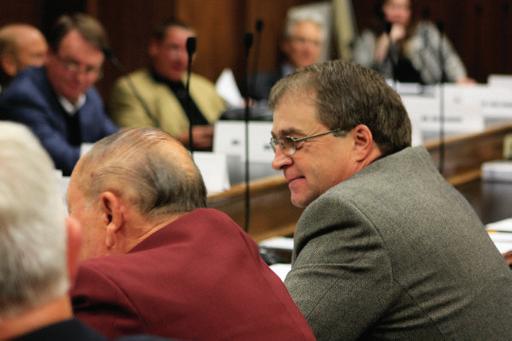
Madison County Judge Wes Fowler (right), a member of the Arkansas Blue Ribbon Committee on Highway Finance, listens to remarks by Sen. John Paul Capps (not pictured), the committee chairman, at their November meeting in the Arkansas Capitol. The Legislature created the 19-member committee a year ago to recommend a plan to generate adequate funding for the state’s highway needs, estimated at $19 billion. Their recommendations are to be presented to the 2011 General Assembly. Two subcommittees – New Revenue, and Revenue Transfer – planned to finish their work in December.
Budgets, spending dominant in 2010
Budgets and spending are expected to be the dominant issues in state government in 2010.
Some of the most important budget decisions legislators face in 2010 and in the next decade will affect public colleges and universities.
On February 8 the legislature will convene in its first session devoted entirely to fiscal issues. Lawmakers will approve budgets for fiscal year 2011, which begins on July 1, 2010. Also, the legislature will set the amounts of lottery scholarships, since that is a spending issue. Some legislative leaders think scholarships can be as much as $5,000 a year for students in four-year universities and $2,500 a year for students in two-year colleges.
Until this year the legislature met every two years, but as a result of a constitutional amendment passed by voters in 2008 legislators now will meet yearly. Te sessions in evennumbered years will be limited to budget and spending issues, although there is a way to file non-budget bills that requires an extraordinary majority.
$100 million cutback translates to loss of turnback funds
County Treasurers and County Judges got the bad news in late October on how a $100 million state budget cut would affect them. Tey learned that General Revenue Turnback to the 75 counties of Arkansas would be decreased by a total of $394,831.
Te hit for most counties was in the $4,500 range, with the most populous counties taking a bigger hit: For instance Benton, $9,612; Faulkner, $7,124; Garland, $7,199; Jefferson, $7,060; Saline, $7,032; Sebastian, $8,196.98; and Washington, $9,771.49.
Stimulus funds to help state map and expand broadband coverage
Arkansas will get $2.1 million in federal stimulus dollars to map broadband access and to help expand broadband coverage in the state, Roby Brock reported in his Nov. 2 edition of Talk Business. Connect Arkansas was awarded roughly $1.6 million for broadband data collection and mapping activities over a two-year period, and almost $500,000 for broadband planning activities over a 5-year period for the state. Connect Arkansas, the designated entity for the state of Arkansas, is a private nonprofit organization based in that state and managed by Little Rock-based Arkansas Capital Corp.
Faulkner prosecutor, six legislators honored
Te Arkansas Prosecuting Attorneys Association recognized Faulkner County prosecutor Marcus Vaden and six state legislators at an awards ceremony. Prosecutor Marcus Vaden was presented with the first Sidney S. McMath Sword of Justice Award, recognizing him as the state’s outstanding prosecutor, said Bob McMahan, the state’s prosecutor coordinator.
Te award is named in honor of McMath, who served as governor from 1949 to 1953 and was a prosecutor in Hot Springs. Te legislators each were recognized with the associations Advocate of Justice Award for working on legislation that was supported by prosecutors. Tey are Reps. Steve Harrelson, Davy Carter, Nathan George, Bubba Powers, and John Paul Wells, and Sen. Steve Faris.
Non-profit foundation boosts Baxter Co. SO
Te Baxter County Sheriff’s Office recently announced the formation of the Baxter County Sheriff’s Foundation, Inc. Te foundation has been created as a non-profit corporation for the purpose of enabling the Sheriff’s Office to innovatively expand, enhance, and sustain its delivery of professional public safety services to the citizens of Baxter County. Te foundation is a separate and distinct organization, and it is not part of the county government.
Te foundation will accomplish its purpose by providing financial support beyond the scope of the Sheriff’s Office’s normal operating budget in areas such as specialized equipment and technology, professional development of officers and staff, and scholarship opportunities for the Baxter County Sheriff’s Office employees and their children, in furtherance of the established mission statement of the Sheriff’s Office, according to Sheriff John Montgomery.
Te Baxter County Sheriff’s Foundation, Inc. has been incorporated in the State of Arkansas. It is governed by a nine member board and is applying for 501 (c3) non-profit status with the IRS. Te foundation has already received a donation of $33,000 from the estate of Mr. Bob Griffith of Midway community. Mr. Griffith’s wish was to do something special and longlasting for the Baxter County Sheriff’s Office. He had received help from the Sheriff’s over the years and especially remembered the Office taking him to dialysis during a snow storm. His loved ones felt that providing the initial funding for the Baxter County Sheriff’ Foundation was an impactful way to honor his wish.

Agroundbreaking ceremony was held at the future site for the Faulkner County Fairgrounds. The new site is located on 40 acres east of the Conway city limits off of East Oak Street. The land for the new fairgrounds was bought from the Hart family. They sold the land to the city at a reduced rate with the understanding that it would be used as a fairgrounds. The 2010 Faulkner County Fair will be held at the new location. The existing fairgrounds will be converted into a baseball complex.
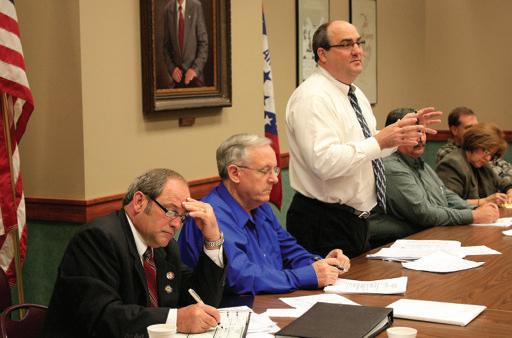
White County Judge Michael Lincoln (left) jots notes during a meeting of the Executive Board of the County Judges Association of Arkansas at a recent meeting in Little Rock. Judge Lincoln serves as Secretary-Treasurer for the association. To his left is Greene County Judge Jesse Dollars, 2nd Vice-President; speaking is Mark Whitmore, chief counsel for the Association of Arkansas Counties, where the planning and business meeting was held. To Whitmore’s left is CJAA President Jimmy Hart, Conway County Judge. First Vice-President is Faulkner County Judge Preston Scroggin.
Baxter County lists warrants on website
Te Baxter County Sheriff’s Office integrated a new feature into its web site (www.baxtercountysheriff.com) in October – a current listing of all active warrants of arrest and body attachments (pick-up orders usually issued in child support cases) available for public viewing.
Te listing automatically updates every 10 minutes as new warrants are entered and warrants are served or otherwise returned to the courts, with no additional manpower needed or costs involved to accomplish this, according to Sheriff John Montgomery. Te listing provides basic information about the warrant, including the complete name of the person, the charge, and the bond amount, all of which is public information.
Te Sheriff’s Office currently holds over 4,000 active felony and misdemeanor warrants, some of which date back as far as 1984. Tis situation is very common throughout the state, as people who are wanted move around frequently, change jobs, change names, and other reasons that make warrant service problematic in many instances.
Third round of grants awarded to Clerks/Recorders
Tirteen Circuit Clerks and Recorders received an extra Christmas present in December, and it was not a lump of coal. Tey received money for updated technology. Tose 13 Recorders received a total of $266,982.67 in Automated Records Systems Fund Grants. Since the inception of the program in late 2007 nearly three-quarters of a million dollars has been awarded to County Recorders around the state. Te money is to be used to facilitate movement toward e-recording and other types of automated record keeping in the offices of the County Recorders.
Act 615 of 2007 increased recording fees substantially in order to help modernize the operations of the Circuit Clerk / Recorders. Since large counties raise much more money in recording fees than smaller counties – there is a special feature in the law to help the smaller counties through grants.
Te nine largest populated counties in Arkansas – Benton, Craighead, Faulkner, Garland, Jefferson, Saline, Sebastian, Washington and Pulaski – contribute $1 to the Grant Fund for each document recorded in the office of the County Recorder. Te Automated Records System Fund is maintained by the Association of Arkansas Counties and the County Recorders of the nine largest counties serve as the Automated Records Systems Fund Committee. Tey establish the grant guidelines and review grant applications submitted by Circuit Clerk / Recorders from the other 66 counties.
Te grants were awarded to: Clerk/Recorder - $25,000 for a land management records system and a redaction program Clerk/Recorder - $56,830 for an automated land records management system Clerk/Recorder - $16,839 for scanning deed and mortgage books Clerk/Recorder - $30,000 for scanning and indexing deed and mortgage books Clerk/Recorder - $13,455 for computers, a server and a back-up system Clerk/Recorder - $6,312 for two computers, printers, software and installation Clerk/Recorder - $26,719 for digitizing 546 rolls of microfilm Clerk/Recorder - $5,750 for a scanner cuit Clerk/Recorder - $7,469 for scanning old records Clerk/Recorder - $21,045 for scanning old deed and mortgage books Recorder - $5,543.99 for scanning index books Clerk/Recorder - $25,000 for conversion of 1980 through 1997 land records Clerk/Recorder - $27,019.68 for digitizing microfilm records
Converting to newer technology is expensive – but this grant program is helping many counties make the conversion sooner than they otherwise would. Horace Greeley said, “Common sense is very uncommon”. But, there is no doubt that this legislation and subsequent grant program is a very good common sense idea that is moving smaller counties forward technologically.
Gates Grant to help libraries speed up Internet access
A $735,207 grant from the Bill and Melinda Gates Foundation will help about 20 percent of Arkansas’ public libraries upgrade their Internet access.
About 50 of the state’s 230 public libraries have Internet bandwidth slower than 1.5 megabits per second - the minimum connectivity speed recommended by the Gates Foundation for libraries. Nationally, 60 percent of libraries say their Internet speed is insufficient, according to the foundation.
Altogether, $3.4 million in grant money is going to Arkansas, Kansas, Massachusetts, New York and Virginia. Virginia’s $977,468 grant was the largest grant, while Arkansas’ gift ranked third.
Arkansas was a beneficiary, in part, because of need, said Jill Nishi, deputy director of the foundation’s U.S. libraries program.
A 2008 report by the Washington-based Information Technology and Innovation Foundation ranked Arkansas 49th in the country in broadband telecommunications.
“Public libraries are an important source of access to the Internet and technology for many people who can’t afford it, or because it’s not available where they live,” Nishi said. “So the public library really becomes an important point of access for people to access online educational, economic and social opportunities.”
Te Arkansas libraries receiving money are mostly in small, rural towns, said Debbie Hall, grants and special projects manager for the State Library. Te State Library drafted the state’s Gates Foundation application.
Te grant money, which should be available around February, will cover half the cost of upgrading each library’s Internet service to the minimum 1.5 megabits per second threshold, Hall said. After two years, the libraries must cover the cost of the upgrade themselves.
A portion of the grant money will also pay for state employees to train rural librarians on how to improve computer service for their patrons.
“Tese small libraries are usually staffed by somebody who does not have the technology knowledge needed to sometimes make sure the computers are in working condition,” Hall said. “If something happens, they aren’t sure what to do.”
Nearly 40 percent of Americans - often from low-income families - don’t have high-speed Internet access at home, according to the foundation. And in 70 percent of communities, the public library is the only provider of free Internet service, the foundation said.
State Library Director Carolyn Ashcraft said patrons are turning to library computers in increasing numbers.
Tey use these public computers to register for unemployment, apply for jobs, register to vote, earn a GED, take college courses and visit social networking sites, among other things.
“If you don’t have a computer at home, or you can’t afford the cost of Internet, you need to go to something available to you as a member of the public,” Ashcraft said. “Te libraries tend to be where people turn.”
Te Pine Bluff/Jefferson County Library System is among the Arkansas libraries getting the grant money to help increase Internet bandwidth. Director Dave Burdick said only the main library in Pine Bluff has adequate Internet speed.
– By John Krupa
Randolph County officials have mixed emotions about relocating offices
Change is good, however, out with the old and in with the new can often be bittersweet.
“Emotionally it was very hard to move,” Randolph County Clerk Janis Mock said concerning her office’s move to the former Bank of Pocahontas building at the corner of Broadway and Marr. “It was hard to leave the courthouse and the people we worked with. I know we’re just across the street – but it’s really different.”
Te county clerk’s office, along with the county treasurer’s office, was closed Oct. 1-2 in order to move office furnishings along with over 170 years of records. “It’s a big switch,” Mock said. “Tere were records that have been housed in the courthouse since 1836 that had to be moved.”
Mock had nothing but praise for the county’s maintenance staff and county inmates who had the offices’ furnishings and records, most of which was moved by the first day.
Carolyn Towell, Deputy at Large, has the longest tenure of the office, having been an employee at the Randolph County Courthouse since 1975. Mock, along with Bobbie Lane, deputy clerk, came on board in 1979.
“I’ve been at that courthouse for 30 years,” Mock said. “Tis has been really hard. I popped over yesterday and it was so quiet. I couldn’t help thinking, ‘were we that noisy?’”
Mock said although she missed her former home, the larger office did have its perks that included a nice basement area for each of the county offices to store items, along with a larger office complete with a view of historic downtown Pocahontas.
In addition to the county clerk and county treasurer, the Veteran’s Office and Office of Emergency Management have also been moved into the new courthouse annex building. Te Randolph County Judge’s offices will move into the courthouse in the vacated county clerk’s office while the treasurer’s office will be utilized by the circuit clerk’s office.
– By Susan Tielemier Pocahontas Star Herald
Rep. Maxwell floats lignite mining idea
Rep. Allen Maxwell is floating the idea of lignite coal strip mining in south Arkansas. Te Joint Committee on Energy and the House Committee on Agriculture, Forestry and Economic Development, in a November meeting at the Association of Arkansas Counties facilities, heard presentations on what would be involved in the mining, along with some possible economic developments that would accompany it.
Such mining would be an economic boon for Arkansas, according to Rep. Maxwell of Monticello. He acknowledged, however, that the idea does not have the support of the Governor’s Office, due to environmental concerns.
Arkansas’s soil contains an estimated 9 billion tons of lignite at depths of less than 150 feet, mostly in southwest Arkansas, according to the Arkansas Geological Survey.








